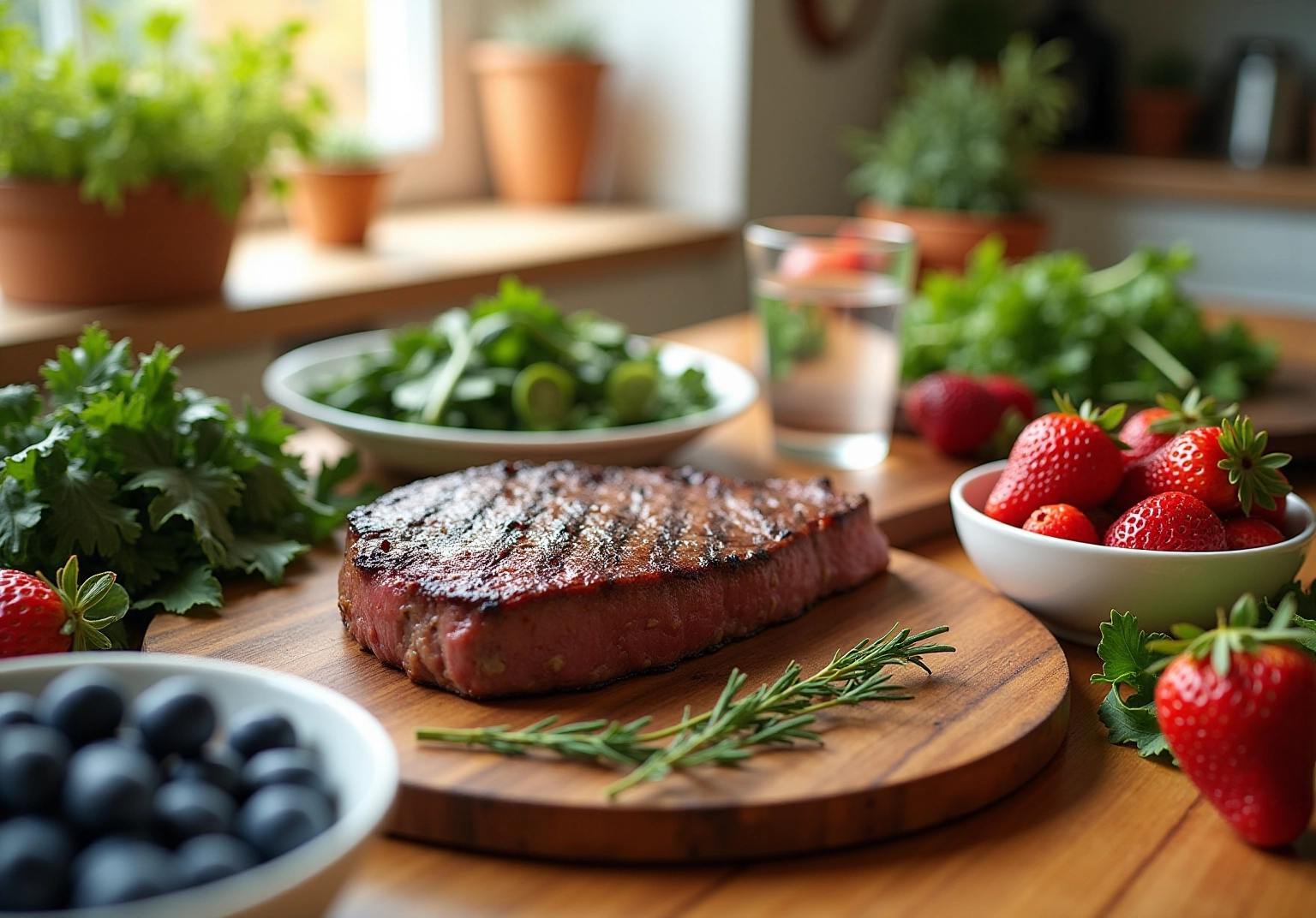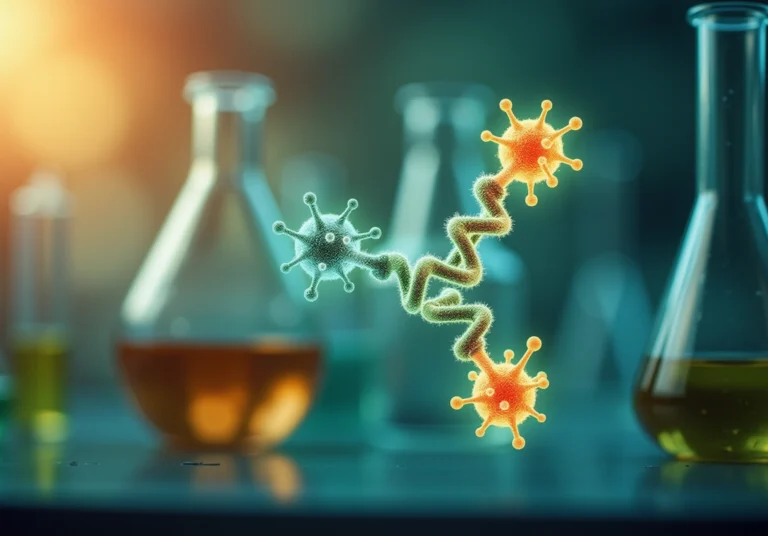4 Steps on How to Reduce Progerin Naturally for Better Aging
Overview
To reduce progerin naturally for better aging, individuals can adopt a nutrient-rich diet that emphasizes high-quality animal products and antioxidant-rich foods. Additionally, lifestyle changes such as regular exercise and effective stress management play a crucial role. These strategies collectively lower progerin levels, promoting healthier aging and enhancing overall well-being.
Furthermore, specific dietary strategies and lifestyle modifications can be implemented to support this goal. For instance, incorporating a variety of fruits and vegetables can provide essential antioxidants, while regular physical activity helps manage stress and improve overall health.
In conclusion, by making informed dietary choices and embracing a proactive lifestyle, individuals can take significant steps toward reducing progerin levels. This not only supports healthier aging but also contributes to enhanced quality of life. Explore further resources to discover more about these impactful strategies.
Introduction
Progerin, a protein associated with accelerated aging and serious health issues, presents a significant challenge in the pursuit of longevity. Research underscores its role in cellular dysfunction and age-related diseases, making it crucial to understand how to naturally reduce progerin for healthier aging.
What if simple dietary adjustments and lifestyle changes could be the key to mitigating its effects and enhancing vitality? Exploring practical strategies to lower progerin levels may not only extend lifespan but also improve quality of life as individuals age.
Understand Progerin and Its Role in Aging
Progerin, a truncated form of the lamin A protein, plays a crucial role in maintaining the structural integrity of the cell nucleus. Its accumulation is significantly linked to Hutchinson-Gilford Progeria Syndrome (HGPS), a rare genetic disorder characterized by accelerated aging and severe cardiovascular issues. Research demonstrates that this protein interferes with cellular functions, leading to nuclear instability and contributing to the aging process.
Understanding how progerin functions at the cellular level is essential for developing effective methods on how to reduce progerin naturally, which promotes healthier aging. Notably, research suggests that understanding how to reduce progerin naturally through lifestyle and dietary choices, such as adopting a diet rich in high-quality animal products, can significantly influence progerin levels. This positions progerin as a viable target for interventions aimed at enhancing longevity and vitality.
Furthermore, low-dose naltrexone (LDN) has emerged as a promising therapy in the anti-aging landscape. Its unique action on the body’s opioid receptors may offer anti-inflammatory benefits. While LDN is generally well-tolerated, it can result in mild side effects such as sleep disturbances, gastrointestinal issues like nausea and constipation, and fatigue, which are typically transient. Exploring these options could pave the way for improved health outcomes as we age.
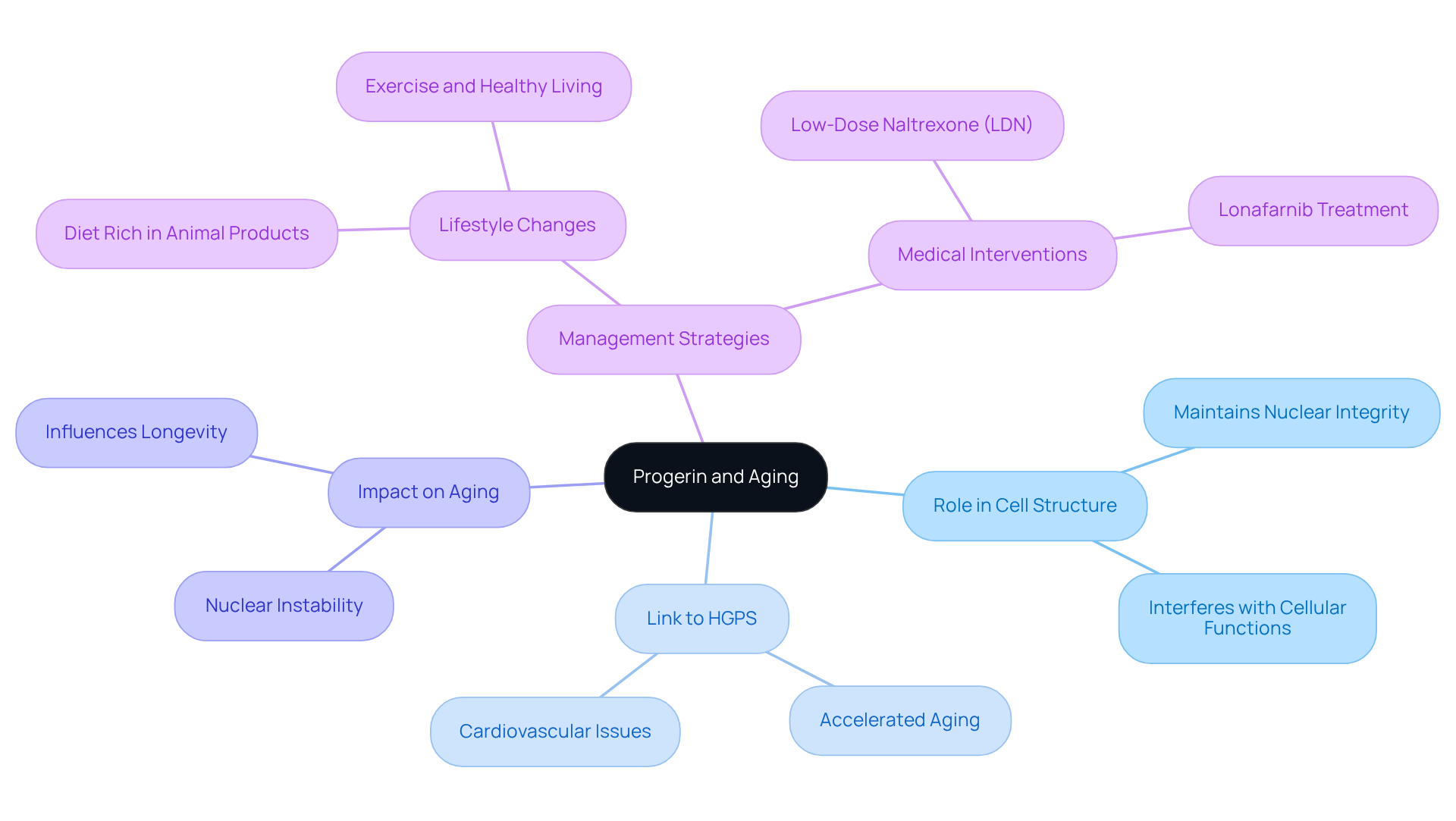
Adopt a Nutrient-Rich Diet to Lower Progerin
To understand how to reduce progerin naturally, it is essential to adopt a nutrient-dense diet that emphasizes high-quality animal-based foods, such as ribeye steaks, alongside antioxidant-rich plant foods. Here are some dietary strategies:
- Include Antioxidant-Packed Foods: Foods like berries, leafy greens, and cruciferous vegetables (such as broccoli and kale) are abundant in antioxidants that counteract oxidative damage, which can worsen progeroid buildup.
- Concentrate on Nutritious Fats: Incorporate sources of omega-3 fatty acids, like fatty fish (salmon, mackerel) and nuts (walnuts, flaxseeds), which possess anti-inflammatory qualities that may assist in lowering harmful protein concentrations.
- Prioritize Protein: A diet rich in high-quality proteins, particularly from animal sources like grass-fed beef and eggs, provides essential amino acids that support cellular repair and regeneration. For instance, preparing ribeye steaks by allowing them to come to room temperature, seasoning them well, and cooking them to a perfect medium-rare can ensure you enjoy a nutritious meal that aligns with your anti-aging goals. This method is detailed in our user manuals, which provide step-by-step instructions for cooking the perfect steak.
- Limit Processed Foods: Decreasing the consumption of processed and sugary items can assist in reducing inflammation and oxidative stress, both of which are associated with elevated amounts of a specific protein.
- Consider Supplements: Certain supplements, such as vitamin D and sulforaphane (found in broccoli), have been shown to aid in the removal of aging proteins. Consult with a healthcare provider before starting any new supplements.
By concentrating on these dietary approaches, individuals can establish a strong nutritional base that promotes healthy aging and demonstrates how to reduce progerin naturally. Many individuals, including those who have shared their experiences in our testimonials, have found success with a meat-centric diet, emphasizing the importance of quality animal-based foods.
Incorporate Lifestyle Changes for Optimal Results
Along with dietary adjustments, embracing particular lifestyle changes can also assist in understanding how to reduce progerin naturally and encourage healthy aging. Here are some actionable steps:
-
Engage in Regular Physical Activity: Exercise has been shown to improve autophagy, the body’s natural mechanism for removing damaged cells, including those containing harmful proteins. Aim for at least 150 minutes of moderate aerobic activity each week, such as brisk walking or cycling. The Hunza people, known for their longevity, incorporate natural physical activities into their daily lives, contributing to their remarkable health.
-
Manage stress, as ongoing pressure can adversely affect cellular well-being and is important for understanding how to reduce progerin naturally. Incorporate stress-reducing practices such as mindfulness, yoga, or meditation into your daily routine. These practices not only help in managing stress but also promote overall well-being, similar to the holistic lifestyle embraced by the Hunza community.
-
Prioritize Sleep: Quality sleep is crucial for cellular repair and regeneration. Strive for 7-9 hours of rejuvenating sleep nightly to promote general well-being and reduce harmful protein concentrations. As seen in various studies, including those on innovative therapies, adequate sleep is essential for maintaining optimal health and longevity.
-
Stay Hydrated: Proper hydration is essential for maintaining cellular function. Aim to consume a minimum of 8 glasses of water each day, adjusting for activity intensity and climate. Hydration plays a vital role in supporting bodily functions and can enhance the effectiveness of dietary supplements aimed at anti-aging.
-
Limit Alcohol and Tobacco Use: Both alcohol and tobacco can contribute to oxidative stress and inflammation, leading to elevated levels of aging-related proteins. Reducing or eliminating these substances can greatly enhance overall health, aligning with nutritional practices that emphasize quality options for longevity.
By combining these lifestyle modifications with a nutrient-dense diet, including high-quality animal-derived products and cutting-edge dietary supplements, individuals can discover how to reduce progerin naturally, creating a synergistic effect that improves their efforts to lower harmful proteins and encourage healthy aging.
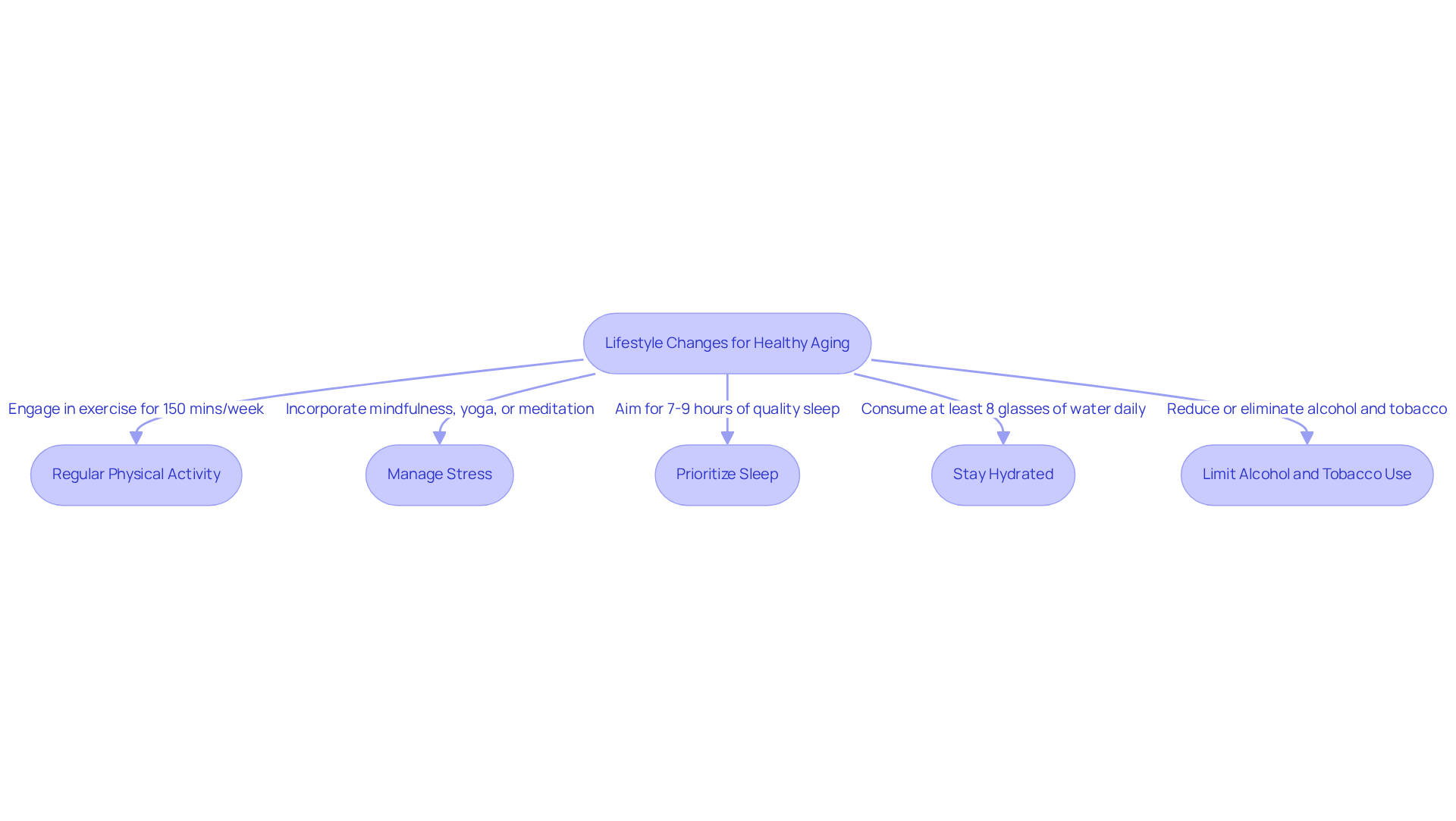
Monitor Progress and Adjust Your Approach
To effectively monitor your progress on how to reduce progerin naturally and enhance your aging process is crucial. Here are several strategies to help you track your journey:
-
Keep a Meal Journal: Recording your daily meal intake enables you to recognize dietary patterns and make informed decisions. Focus on how various foods influence your energy and general health.
-
Track Physical Activity: Utilize a fitness tracker or app to monitor your exercise routine. Aim to gradually enhance your activity intensity, observing any modifications in your physical and mental condition. Statistics show that 92% of smartwatch users leverage their devices to track and improve their health and fitness, highlighting the effectiveness of these tools.
-
Evaluate Tension: Regularly assess your tension and the efficacy of your tension management methods. Modify your habits as needed to guarantee you are efficiently handling pressure, which is essential for overall health.
-
Regular Health Check-Ups: Arrange regular examinations with your healthcare provider to assess important health markers, including blood pressure, cholesterol levels, and biomarkers associated with aging.
-
Be Open to Adjustments: If certain dietary or lifestyle changes do not yield the desired results, be willing to adapt your approach. Experimenting with different foods, exercise routines, or stress management techniques can lead to better outcomes.
By actively monitoring your progress and remaining adaptable, you can optimize your strategies for how to reduce progerin naturally while improving your overall health as you age.
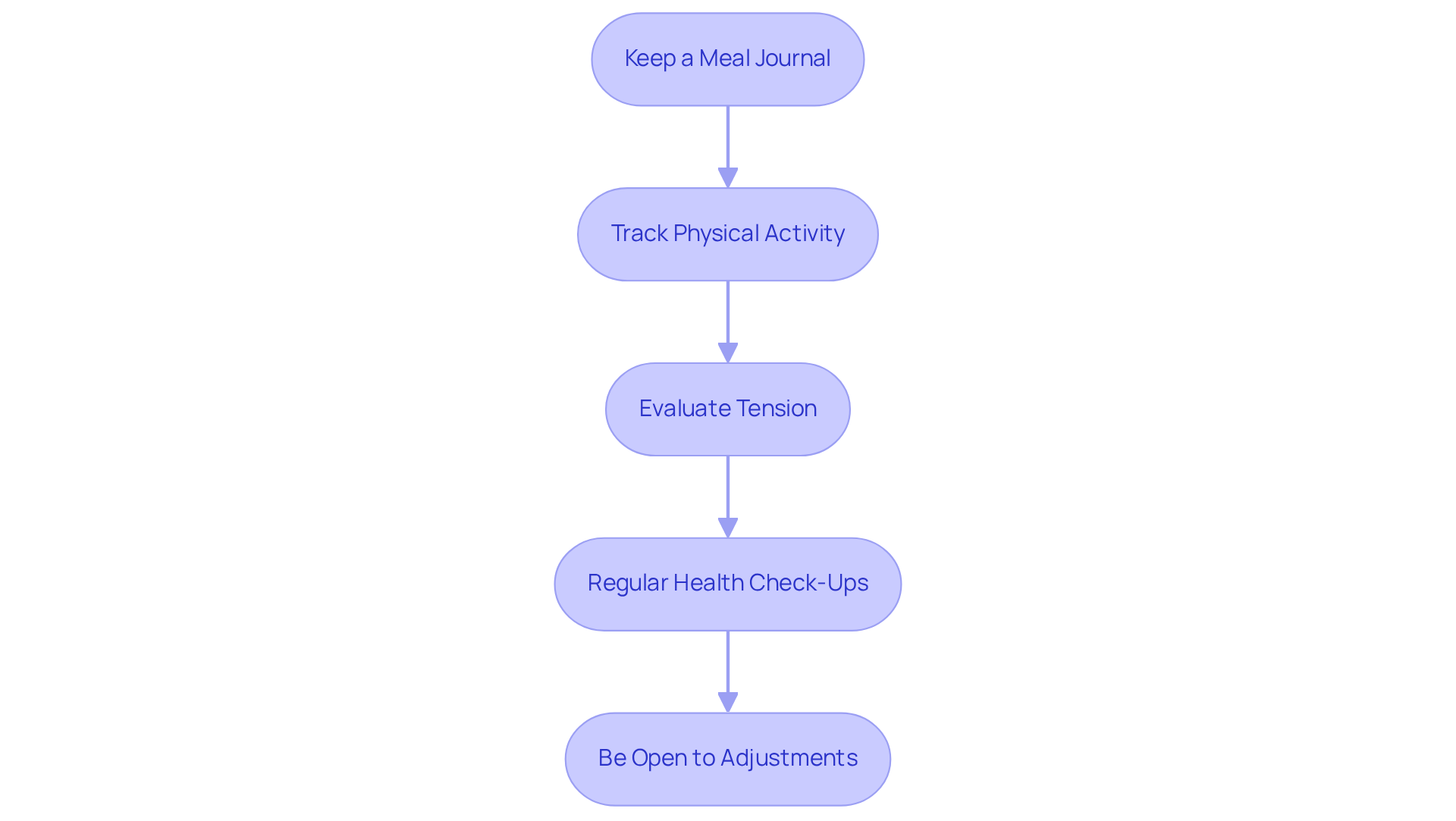
Conclusion
Reducing progerin naturally is a pivotal step toward promoting healthier aging and enhancing overall vitality. By understanding the role of progerin in cellular aging and implementing targeted dietary and lifestyle changes, individuals can significantly impact their longevity and quality of life. The insights provided in this guide serve as a foundation for anyone looking to optimize their health through informed choices.
Key strategies discussed include:
- Adopting a nutrient-rich diet that emphasizes high-quality animal products and antioxidant-rich plant foods.
- Implementing lifestyle modifications such as regular exercise, stress management, and adequate sleep.
- Monitoring progress through meal journaling and fitness tracking to empower individuals to tailor their efforts for optimal results.
Ultimately, the journey to reduce progerin naturally is not just about combating aging; it’s about embracing a holistic approach to health. By integrating these practices into daily life, individuals can cultivate a more vibrant and resilient existence. The significance of understanding how to reduce progerin naturally cannot be overstated; it is a proactive measure that underscores the potential for improved health outcomes as one ages.
Frequently Asked Questions
What is progerin and its role in aging?
Progerin is a truncated form of the lamin A protein that is crucial for maintaining the structural integrity of the cell nucleus. Its accumulation is linked to Hutchinson-Gilford Progeria Syndrome (HGPS), a genetic disorder characterized by accelerated aging and severe cardiovascular issues.
How does progerin affect cellular functions?
Progerin interferes with cellular functions, leading to nuclear instability, which contributes to the aging process.
Why is it important to understand progerin at the cellular level?
Understanding how progerin functions is essential for developing effective methods to reduce its levels naturally, which can promote healthier aging.
What lifestyle and dietary choices can influence progerin levels?
Adopting a diet rich in high-quality animal products has been suggested to significantly influence progerin levels.
What potential therapies are being explored for reducing progerin and promoting longevity?
Low-dose naltrexone (LDN) has emerged as a promising therapy due to its unique action on the body’s opioid receptors, potentially offering anti-inflammatory benefits.
What are the side effects of low-dose naltrexone (LDN)?
LDN is generally well-tolerated but can cause mild side effects such as sleep disturbances, gastrointestinal issues like nausea and constipation, and fatigue, which are usually transient.
